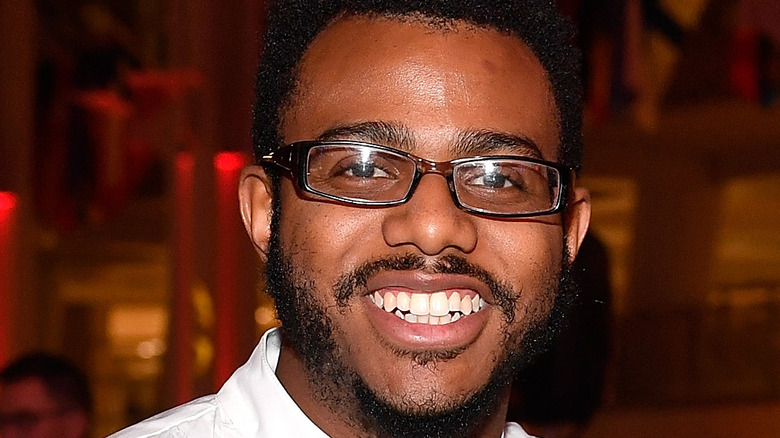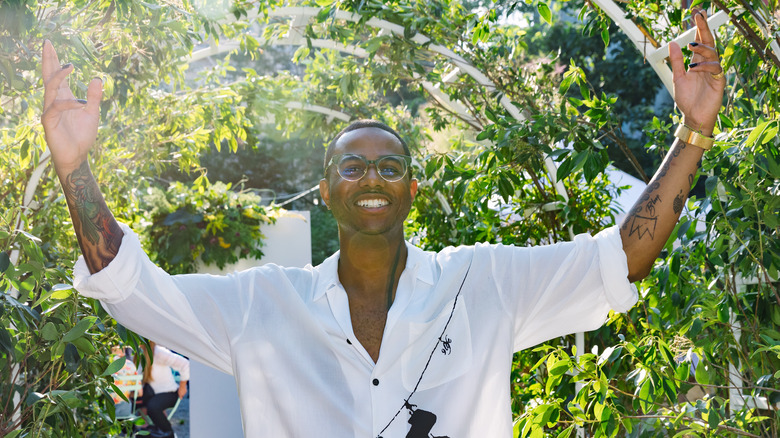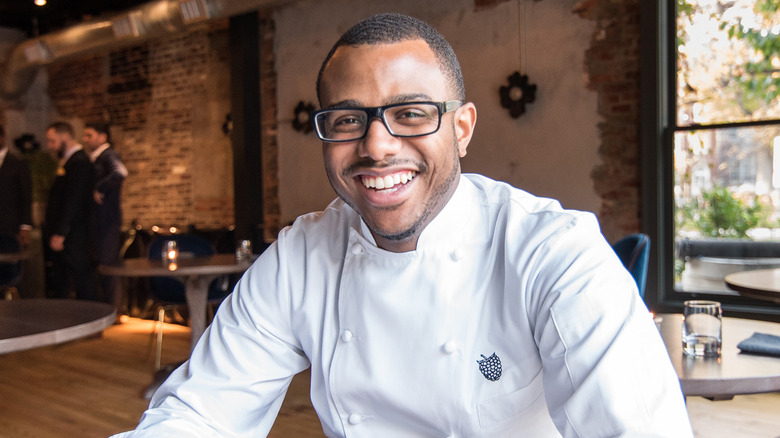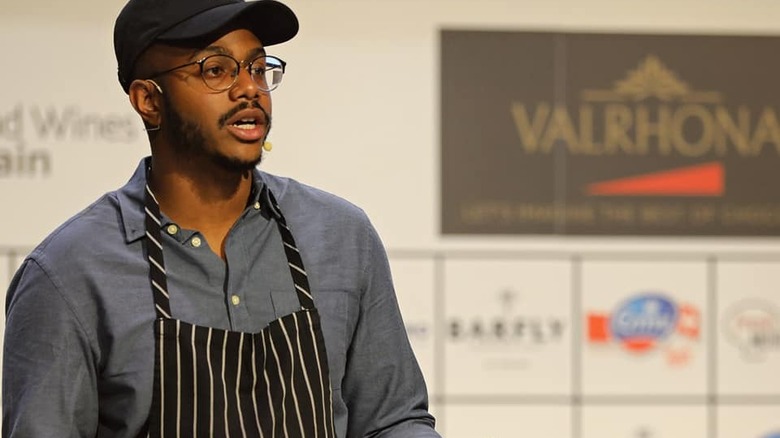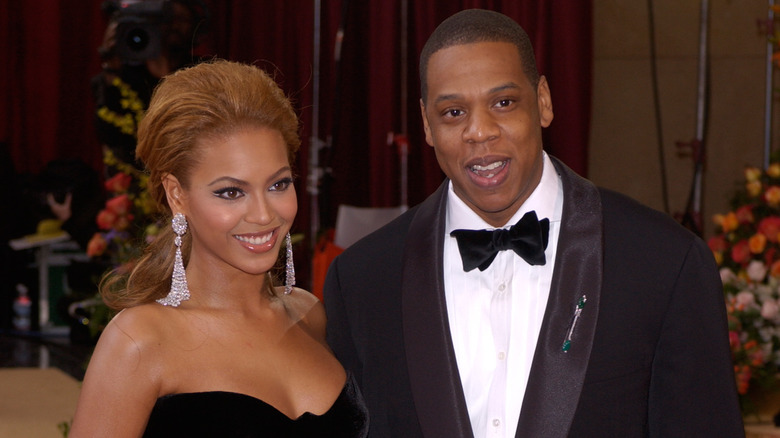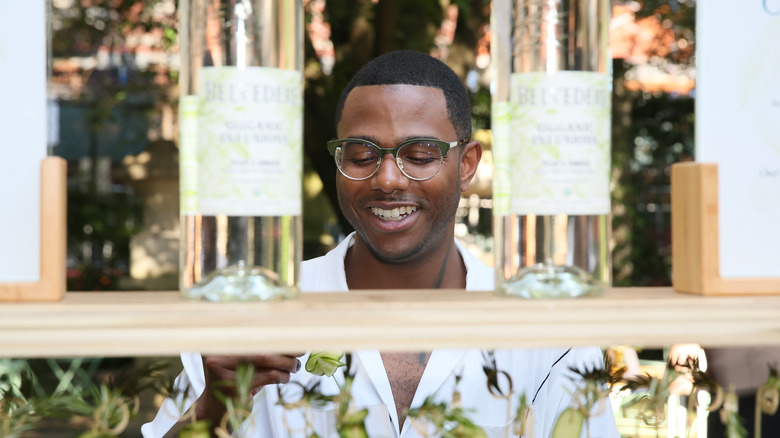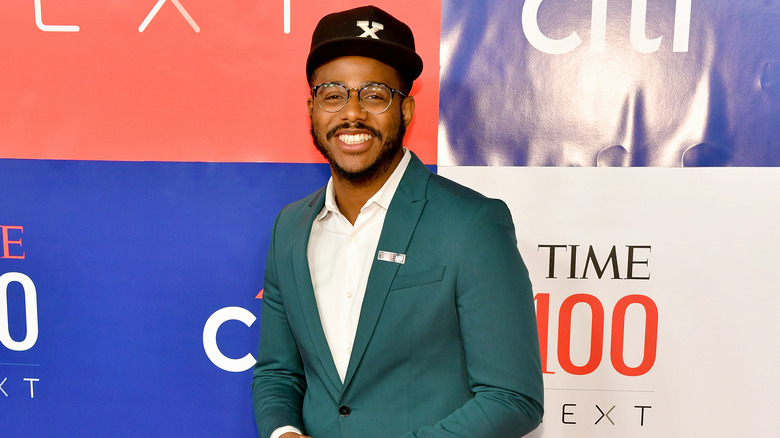Kwame Onwuachi Dishes On Being A Judge And Contestant On Top Chef - Exclusive Interview
We may receive a commission on purchases made from links.
Chef Kwame Onwuachi's star is rising. You may have first learned about this New York-born, Nigerian-raised culinary legend from his stint as a contestant on Season 13 of "Top Chef" or, perhaps you dined at one of the five restaurants he opened before he turned 30, including Afro-Caribbean Kith/Kin in Washington, D.C. If you're later to the party, it might have seen his James Beard Award or his 2019 designation as "Chef of the Year" by Esquire (via Patch) that caught your attention. Or maybe you just noticed Onwuachi when he appeared again on "Top Chef," this time as a judge on Season 18.
If the name Kwame Onwuachi is new to you, though, you can bet that this novelty won't last long. A new motion picture based on his memoir, "Notes from a Young Black Chef," is in the works, starring LaKeith Stanford.
In an exclusive interview with Mashed, Onwuachi dished on what it was like to be both a contestant and a judge on Top Chef, the meteoric trajectory of his career (including a gig cooking for Jay-Z)–and, why sustainability is one of his great passions.
What it's like to be one of the hottest chefs in the United States
You've had so many successes, from the James Beard Award to being named "the most important chef in America" by The San Francisco Chronicle. Was there one moment that it really sunk in–how successful you were becoming?
I would say, the main moment for me was making my mom proud. More than anything else, more than any award. My mom is a chef and we grew up in the Bronx, and I started by cooking for our catering company. Humble Catering Company that was operated out of our one bedroom apartment. ... Having her being present for a lot of those milestones was so important to me. So important.
I think it was when I opened my first restaurant, she told me how proud she was of me. The Shaw Bijou. She was just very impressed at how I was able to take what she taught me and transform it into what I have now. And the way that I view food now.
What did your mother teach you about cooking?
For one, seasoning my food. She taught me how to do that. So, that's one of the most important things. But cooking with love and cooking from a place of hospitality. I think that's why we get into this industry –because of that and never losing sight of that is what she tries to reiterate to me time and time again.
Your book "Notes from a Young Black Chef," soon to be a movie, talks about how the restaurant industry hasn't been welcoming to people of color. Do you believe that's still a challenge?
Yeah. It'll always be a challenge for a minority. And I think it's important for us to create our own lanes [and] more importantly, and get ownership in the things that we're doing–whether that's ownership of ideas, IP, actual property. And I think that's where real change happens. But, we're in an industry where we don't get the recognition and we haven't gotten it for so long. And until we take matters into our own hands, that will be trending up.
Why Top Chef made Kwame Onwuachi a better chef
What was it like to be a judge on "Top Chef" compared to a contestant?
It was great. It was way better than running around trying to make a taco in 15 minutes — to say that much! So it was really, really cool in having that responsibility. I think for someone like myself, I was able to judge from a point of empathy. I've been in their shoes. So, it wasn't coming from a place of not knowing exactly what it's like to be in these challenges, to have these times of stress, [to] being thrust into this new environment and ... having a bunch of cameras in your face while you're trying to cook something. And I think that was very beneficial.
And then also [I bring] a different palate. I have a different concentration of knowledge than what Tom [Colicchio] does or Padma [Lakshmi] or Gail [Simmons]. So I was able to bring something new and just a different lens than what has been portrayed before.
What was it like to be a contestant in season 13?
Oh man, it was scary. I'll tell you that much. It was so nerve-wracking. It's a lot harder than it looks. However hard you think it is, add times 10 to that, and that's what it's like. It's very, very difficult being in that environment.
But I think you get to learn a lot, right? You get to cook for really amazing people time and time again. And you have to get direct feedback on your cuisine that you're not able to get even at your restaurant. No one's coming up to you and telling you that you're missing a little bit of acid there. They're normally like, "oh, everything was great. Thank you for the meal." So, you're able to get real feedback and evolve and grow as a chef.
What was the hardest part of being on "Top Chef"?
Not knowing what you're doing ... the unknown. And then you add time constraints on top of that, and it makes it very challenging. And that's what "Top Chef" is. They produced some of the best chefs in the world. And you've seen the pedigree of people coming out of that, going on to do amazing things. It's not because of the publicity. It's because of what happens to those kitchens, what happens in that competition.
What was it like to film "Top Chef" in Portland during the pandemic?
It was great. Portland is just a great city. It has so much outdoor stuff to do. But also, the spirit of the city. Especially during the pandemic. It's a pandemic, so everything was shut down. But to see the restaurant industry there, the beautiful people. We did a challenge with the indigenous ... people of Portland, the natives. I think it was cool to see just so much diversity even within that small town, even though the pandemic was going on.
And speaking of the pandemic, what do you think that we as a nation have learned about the value of food service from living through the pandemic?
I mean that we are essential workers. People need to eat. No matter what's going on in the world. So I think that was very prevalent throughout the pandemic, and I hope people continue to respect that moving forward.
Why seasoning makes all the difference, according to Kwame Onwuachi
What do you feel that you gained as a chef from being a contestant [on "Top Chef'] that you were able to carry through to the rest of your career?
I gained the knowledge of how to take feedback. I gained knowledge of self, of how I react in certain situations. I was able to see that firsthand. And then, I was given feedback on my cuisine. Learning how to season things to the point where it can beat out 10 other dishes. And that is very valuable information that I don't take for granted.
You've mentioned seasoning, is seasoning a really important part of your craft as a chef?
It is. Because that's when I'm asked for advice, "What should I do?" I'm like, "season your food." People get sent home [on "Top Chef"] for under-seasoned food more than you would imagine. A little bit of salt goes a long way, and that shouldn't be taken for granted.
Are there any other sort of tips, cooking tips you might have for just the everyday foodie in the kitchen?
Yeah. Salt and acid. Always finish your food with a little bit of salt, and then some acids. Like some lemon or lime. That's really, really important to set the flavors off and make sure that your dishes are going to stand out and [be] "Top Chef"-worthy.
Is there any sort of surprising season that you think everyone should have in their arsenal?
Diamond Crystal Kosher Salt. I think it's very, very important. It has the perfect size of granules. The season thing that I know that you were expecting something a little bigger than that, but if you have Diamond Crystal salt, you can get away with seasoning your food just with salt because of the way it disperses on the food. It has a very even-like crumb to it. So I think that is very important for most people to have.
What it's like to cook for Jay-Z and Beyonce
You've cooked for so many different celebrities, including the Obamas and Dave Chappelle. What has been your most memorable experience cooking for a celebrity?
Probably cooking for the Gold Party. I did Jay-Z and Beyonce's Oscar party. That was pretty memorable for me. Being from New York, Jay-Z has always been my favorite artist, and to cook for him, that was one of the pinnacles of my career, I would say.
That was very private. No press was allowed. And it wasn't about that. It was really about just being able to cook for someone that I looked up to for my entire career or my entire life outside of my career.
What was on the menu?
There were so many things. I did a menu based on Brooklyn and Houston for Jay-Z and Beyonce. So everything from refined chopped cheese sandwiches, with wagyu and truffles, to crustacean with bunch of Creole accouterments. It was really, really cool.
Did Jay-Z like the food?
Yeah, he liked it all. He liked it all.
Why sustainability matters to Chef Kwame Onwuachi
You collaborated with Belvedere Vodka on the launch of their Organic Infusions line with a greenhouse experience in New York City. How did you use your greenhouse to bring their new line to life?
It was really, really fun ... My vision [was] to create this very reminiscent of old New York greenhouse. There was an art installation pretty much based on Keith Haring with some characters to be in there, movie lines and buildings from New York and food. I wanted the greenhouse to be what people think of a greenhouse: green, green, right? And there was mint growing. There were sun gold tomatoes growing. Gooseberries everywhere. And it was stuff that was indicative of the flavor profile of the organic infusions, the pear and ginger.
And then I did a dish that matched that as well. I made a marinated pear and avocado salad with a gooseberry and ginger piri-piri dressing that was very refreshing. It was really, really hot that day, too! It worked in my favor to have something that was really, really cold and bright. And when you walked in, you smelled all the mint. You smelled all that citrus. And, it was an experience for sure.
Why do you think it's important for chefs to follow sustainable practices?
I think if you care you should follow that. You should care about where your stuff comes from. You should care about waste. Because we want to leave this Earth better than when we found it. And we have direct access to a lot of those resources, whether it's organic resources. And we should be thinking of that.
Do you mainly cook with organic ingredients?
Yeah, when I can. But, I try to be conscious about the decisions I'm making about what I put in my body. And what I put in other people's bodies, right? I have that responsibility.
What can everyday home cooks do on a daily basis to make sustainable choices?
I think just be mindful of what you're purchasing, where you're spending your dollars and what you're putting in your body. We eat three times a day. So, I think it's really, really important. I think people think about that in another aspect ... [even] the electronics that they're using. And it should be the same when they eat, if not even more important, when you're thinking about the food.
How Kwame Onwuachi's unique background influences his food
You grew up in so many different places, from New York to Nigeria to Louisiana. How did that background influence the kinds of food that you create?
It influences it a lot. I have a good Rolodex of flavor profiles to reach into, having the Trinidadian background, Jamaican, Nigerian. I'm able to really use that and express that through my cuisine and my heritage. And for some people it is comforting. For some people it is explorative. And I think that's why it's great to really dive into your culture because there's going to be people that know nothing about, and the people that are like thank you so much for putting this on a platform.
Do you think people should use their own culture to inspire their cooking?
I think so. Absolutely. You should always reach back. When a dish tells a story, it has a soul. So I think that's really, really important for people to understand.
Who were your biggest role models as you were developing your own skills as a chef?
Marcus Samuelsson. Everything that he's done. And then I've always looked up to Patrick Clark, Nina Compton. These are the people that I think of. Preston Clark. These are the people that I think when I think of people that are doing things and are trailblazing in industry.
Be on the lookout for the Belvedere Vodka Organic Infusions line. And if you haven't already, be sure to add Kwame Onwuachi's memoir, "Notes from a Young Black Chef" to your summer reading list.
